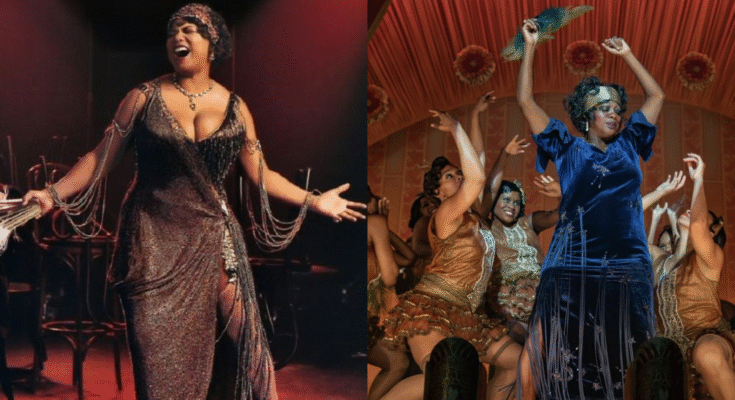The Woman Who Changed Everything
Viola Davis (born August 11, 1965) is an American actress and film producer whose accolades include both the Triple Crown of Acting and EGOT. But these credentials, impressive as they are, barely scratch the surface of who Viola Davis is. She is not merely an actress—she is a force of nature, a barrier-breaker, a voice for the voiceless, and one of the most important artists of our generation.
Time named her one of the 100 most influential people in the world in 2012 and 2017. The New York Times ranked her ninth on its list of the greatest actors of the 21st century (2020). These recognitions arrived not as gifts to an entertainer, but as acknowledgment of an artist who has fundamentally transformed cinema and television through her presence, her intelligence, her power, and her refusal to be invisible.
Her journey is one of the most remarkable stories in entertainment history—not because she is famous, but because she refused to remain unknown.
From the Graveyard of Dreams: A Beginning in Poverty
Viola Davis was born August 11, 1965, in Saint Matthews, South Carolina, U.S. She entered the world on her grandmother’s farm, a place of modest means and deep love. But poverty was the true birthplace of her character. Her family situation was precarious from the beginning—the kind of poverty that isn’t romantic or temporary, but grinding, daily, relentless.
Davis was raised in Central Falls, Rhode Island, where her father found work as a horse groom at nearby racetracks and her mother took on domestic and factory jobs. Their income was frequently insufficient to support the family, and they endured grim rat-infested apartments and occasional food shortages.
This is not background detail. This is the foundation of everything Viola Davis became.
Growing up poor in America is a particular kind of invisibility. When you live in a rat-infested apartment, when your mother works multiple jobs and still can’t provide consistent meals, when you’re the only Black child in certain spaces where people see through you rather than at you—you learn that the world does not consider you valuable unless you prove otherwise.
But in those grim apartments and difficult years, something remarkable happened. Davis discovered an oasis from her family’s financial woes in watching movies. She sat in dark theaters and saw stories unfold. She saw women on screen. She saw herself, distantly, in the faces of actresses. And she thought: “I could do that. I could tell stories. I could matter.”
Growing up poor meant something else, too: it meant she understood what it meant to be forgotten. This understanding would define her entire artistic mission.
The Calling: Finding Art in a Difficult Life
As a child, Davis began acting in school productions and theatre competitions. But this wasn’t a privileged child’s hobby. This was a survival strategy—a way to transform pain into purpose, invisibility into presence.
She discovered a love of acting early in high school. This wasn’t a casual interest that faded. This was a lifeline. Acting gave young Viola Davis something her circumstances could not: hope. In the school theater, under lights, speaking words written by others, she could momentarily escape the poverty that surrounded her. More importantly, she could imagine a future different from her parents’ present.
Theater became her church. The stage became her redemption.
After high school, Davis faced a crucial decision. She could accept the limits her circumstances seemed to impose. Or she could fight. She chose to fight.
Davis enrolled at Rhode Island College, where she majored in theatre and graduated in 1988. Getting to college required determination and support—her mother’s insistence that education was the path out of poverty, teachers who recognized her talent, and her own unshakeable belief that she could transcend her beginnings.
But Rhode Island College was not the end. It was merely a staging ground.

After graduating, Davis made a decision that revealed her true commitment. She proceeded to the Young Peoples School for the Performing Arts in Rhode Island on scholarship before attending the Juilliard School, from which she graduated in 1994.
Juilliard. One of the most prestigious arts schools in the world. A girl from Central Falls, Rhode Island, living in poverty, had made it to the same institution that trained Kelsey Grammer, Robin Williams, John Krasinski, and Oscar Isaac.
This wasn’t luck. This was a woman who refused to accept the world’s assessment of her worth.
Broadway Breakthrough: Finding Her Voice
After Juilliard, Davis moved to New York to begin her professional acting career. What followed was years of small roles, television appearances, and the grinding work of building a career in theater. She appeared in small productions, in off-Broadway shows, in television programs that most people will never see. This was the invisible part of a career—the years before the glamour, the hard work that teaches an actor their craft.
Davis made her Broadway debut in the August Wilson play Seven Guitars (1996) for which she earned her first Tony nomination. This was the moment everything changed. Playing Vera in August Wilson’s tragic comedy, Davis demonstrated something remarkable: she could command a stage. She could make audiences lean forward in their seats. She could make them feel the weight of her character’s history.
For this role, Davis was nominated for a Tony Award and a Drama Desk Award, and her performance won the 1996 Theater World Award.
This was recognition. But it was not fame. Most people still didn’t know who Viola Davis was.
That changed in 2001. She would later win two Tony Awards, both for Wilson plays. Her first win was for Best Featured Actress in a Play playing the character Tonya, a woman grappling with trauma and loss in King Hedley II (2001).
Playing Tonya in King Hedley II, Davis delivered a performance that theater critic Christopher Rawson described as having “a dead-on intensity which, when she launches into her great aria about parenthood and death, sweeps all before it.” This monologue—a woman’s desperate speech about motherhood, about love, about impossible choices—became legendary. Theater professionals spoke of it in hushed tones. It was the kind of performance that reminds us why theater exists: to capture the full, complex, devastating emotional truth of human experience.
Viola Davis had become a force on stage. But the world of theater, even Broadway theater, reaches only a limited audience. She remained largely unknown outside of theater circles.
The Turning Point: Doubt (2008)
Everything changed when director John Patrick Shanley adapted his Tony-winning play “Doubt” for film. Acting alongside Meryl Streep, Philip Seymour Hoffman, and Amy Adams, Davis earned the nominations for only eleven minutes of on-screen time, powerfully portraying a parent whose son might have been abused by a priest.
Eleven minutes. On screen.
In those eleven minutes, Viola Davis changed cinema.
Her character, Mrs. Miller, is a mother who suspects her son has been abused. She arrives at a convent school to speak with the nun (Meryl Streep) who may have hidden the abuse. What could be a simple scene becomes a masterclass in emotional depth. Davis’s Mrs. Miller is dignified, desperate, intelligent, and heartbreaking. She is a woman fighting for her child with the only weapon she possesses: her dignity and her mother’s love.
After her career boost, Davis appeared in more television programs, including Brothers and Sisters (2008) and The United States of America of Tara (2010), and in additional feature films.
But more importantly, after Doubt brought her the widespread recognition that had been largely absent from her under-the-radar reputation as a character actor.

Suddenly, Hollywood knew who Viola Davis was. Studios wanted her. Directors requested her. She was no longer invisible.
The Help: Raising Her Voice
In 2011, Davis took on a role that would reach millions: Aibileen Clark in “The Help,” playing a domestic worker in the 1960s Deep South who participates in a secret project to document the stories of Black maids and the white families they worked for.
The Help was controversial. Some critics argued it centered the wrong perspective, that it was a story about white women saving Black women rather than Black women saving themselves. These criticisms had merit. But what cannot be disputed is that Viola Davis’s performance was extraordinary. She played Aibileen with dignity, with intelligence, with a kind of quiet strength that suggested worlds of untold stories behind her eyes.
Audiences across the United States and internationally have admired her for her work- including her celebrated, Oscar-nominated performances in The Help (2011), Doubt (2008).
The film reached millions of people. And Viola Davis, who had grown up in poverty in Central Falls, Rhode Island, was now a Hollywood star.
But she refused to become simply a star. She remained an artist.
Fences: The Apotheosis
In 2010, Davis returned to Broadway to star in August Wilson’s Fences opposite Denzel Washington. She would later win two Tony Awards, both for Wilson plays. Her second win was for Best Actress in a Play playing Rose Maxson, a working class mother in Fences (2010).
Playing Rose Maxson—a woman trapped in a marriage to a man who has betrayed her, raising his illegitimate child, holding together a family on the verge of collapse—Davis delivered a performance of such devastating complexity that observers spoke of it as one of the great performances in modern theater.
This was the role that would change everything. Because in 2016, Denzel Washington directed and starred in the film adaptation of Fences, and he asked Viola Davis to reprise her role as Rose.
In 2016, Davis reprised her role as Rose Maxson for the film adaptation of Fences directed by and starring Denzel Washington. Her performance garnered critical acclaim and she received her third Academy Award nomination, making her the first black actress in history to achieve this feat. She subsequently went on to win the Academy Award for Best Supporting Actress, the Golden Globe Award for Best Supporting Actress, the Screen Actors Guild Award for Outstanding Performance by a Female Actor in a Supporting Role, and the BAFTA Award for Best Actress in a Supporting Role.
When Viola Davis accepted the Academy Award for Best Supporting Actress, she delivered a speech that has become iconic. In her acceptance remarks, Davis spoke about her mission as an artist:
“You know, there is one place that all the people with the greatest potential are gathered and that’s the graveyard. People ask me all the time — what kind of stories do you want to tell, Viola? And I say exhume those bodies. Exhume those stories — the stories of the people who dreamed big and never saw those dreams to fruition, people who fell in love and lost.”
These words reveal the entire philosophy of Viola Davis’s career. She is not interested in telling comfortable stories. She is interested in exhuming the bodies buried in the graveyard—the stories of ordinary people, of Black people, of women, of the voiceless and invisible. She is interested in resurrection.
How to Get Away with Murder: Television Transformation
While pursuing her film career, Davis took on a role on television that would become transformative: Annalise Keating in ABC’s legal drama “How to Get Away with Murder” (2014-2020).

Playing a brilliant, complex, morally ambiguous criminal law professor who manipulates her students to assist in a murder cover-up, Davis demonstrated her range. Annalise Keating is not a sympathetic character. She is manipulative, powerful, damaged, and ultimately tragic. Davis played her with intelligence and vulnerability—making audiences understand and even root for a character who does terrible things.
In 2015, Davis won the Emmy Award for Outstanding Performance by a Female Actor in a Drama Series for her work in ABC’s How To Get Away With Murder, making her the first black woman in history to take home the award.
This was historic. This was a moment of recognition that her talent could no longer be denied, ignored, or marginalized.
The EGOT: The Rare Air of Immortality
By 2023, Viola Davis had won an Academy Award (for Fences), Emmy Awards (including for How to Get Away with Murder), and Tony Awards (for King Hedley II and Fences). But she had not yet won a Grammy. Most performers never come close to the rare achievement called EGOT—winning an Emmy, Grammy, Oscar, and Tony.
Then, in 2023, Davis released her memoir, “Finding Me: A Memoir,” which chronicles her life from growing up in poverty in Rhode Island to her remarkable rise in theater, television, and film.
Davis’s memoir, Finding Me, was published in 2022. The following year she won a Grammy for the audio version of the book. With that award, she became the third Black woman to win an EGOT.
This achievement places her in a category of extraordinary artists. She is only the third to achieve both EGOT and Triple Crown of Acting, after Helen Hayes and Rita Moreno.
But what’s more important than the rarity is what it means. Viola Davis, a girl from Central Falls, Rhode Island, who grew up in poverty, who was told by the world that she didn’t matter, has become one of the most decorated artists in human history.
Ma Rainey’s Black Bottom: The Ongoing Vision
In 2020, Davis appeared in “Ma Rainey’s Black Bottom,” playing the title role of Ma Rainey, the legendary blues singer known as “the Mother of the Blues.” Alongside Chadwick Boseman, Davis delivered a performance that was powerful, complex, and historically grounded.
Davis portrayed Rainey as a strong-willed, larger-than-life figure and insisted that her character’s signature look remained historically accurate. Davis earned her fourth Oscar nomination for the role, making her the most Oscar-nominated Black actress in history and the only Black actress with two best actress nominations.
This recognition—being the most Oscar-nominated Black actress in history—represents something profound. It is recognition not just of her talent, but of her persistence in a system that historically excluded her.
Beyond Acting: The Producer and the Activist
What distinguishes Viola Davis from merely talented actors is her commitment to using her platform for transformation.
In addition to acting, Viola currently produces alongside her husband and producing partner, Julius Tennon, through their JuVee Productions banner. Together they have produced award-garnering productions across theater, television, and film.
Through JuVee Productions, Davis has become a producer and creator, not just a performer. This is crucial. As a producer, she controls what stories get told, who tells them, and how. She is no longer waiting for roles. She is creating them.
As a producer, Davis and her husband, Julius Tennon, founded JuVee Productions to give a voice to the voiceless through strong, impactful, and culturally relevant films.
This mission statement—to give a voice to the voiceless—reflects her entire artistic and philosophical commitment.

Philanthropy and Community: Where She Came From
Perhaps most tellingly, Davis has not forgotten where she came from. Growing up in abject poverty, Davis consistently uses her platform to support her hometown community of Central Falls, Rhode Island. She has donated to save a public library, supported Central Falls High School’s Theatre Department, and partnered with Vaseline to host a one-day healing project.
On a national scale, Davis collaborates with the Hunger Is campaign to help eradicate hunger across America.
This is not philanthropy as publicity. This is a woman remembering what it meant to go hungry, to live in rat-infested apartments, to lack access to basic resources. This is a woman using her wealth and platform to ensure others don’t have to suffer as she did.
In September 2017, Davis started the $30K in 30 Days Project with Hunger Is, awarding a $1,000 grant to the Rhode Island Community food bank in her home state.
The Awards: A Partial Accounting
The sheer number of awards and recognitions Viola Davis has received could fill pages. But what’s important is not the inventory, but what they represent: a woman who has excelled in every medium in which she has worked.
Davis is the first actress of color to win the Primetime Emmy Award for Outstanding Lead Actress in a Drama Series. Davis is the first African-American to win five Screen Actors Guild Awards. Davis is also tied for the most film wins for an actress at the Screen Actors Guild Awards; and with six overall wins, she is the most awarded African American.
She has also received nominations for six Golden Globes Awards and three BAFTA Awards, winning one of each, in addition to winning the Academy Award for Best Supporting Actress for her performance in Fences (2016). This led to her becoming the first black performer to achieve the Triple Crown of Acting by winning a competitive Oscar, Emmy and Tony.
To be the first Black performer to achieve the Triple Crown of Acting is to shatter a ceiling that once seemed impenetrable.
The Hollywood Walk of Fame: Public Recognition
In 2017, Davis was presented with the 2,597th star on the Hollywood Walk of Fame by her Doubt co-star and friend Meryl Streep. While accepting the honor, Davis said: “It’s like my life flashing before my eyes, and all I can say is, God has blessed my life in abundance.”
This moment—being celebrated by Meryl Streep, one of cinema’s greatest actresses, on Hollywood’s most famous sidewalk—represents a kind of ultimate recognition. It is the entertainment industry saying: “You belong here. You have mattered. You will be remembered.”
The Marriage, the Family, the Private Joy
Davis married actor Julius Tennon in June 2003. In 2011, the couple welcomed a daughter, Genesis (b. 2010), via adoption. Davis is also a stepmother to Tennon’s two children from previous relationships.
In her personal life, Davis has built a family characterized by love, commitment, and intentional choice. Her decision to adopt, her willingness to embrace Tennon’s children from previous relationships, her public commitment to her husband—these choices reveal a woman who understands that family is built through love and intention, not merely biology.
What Makes Viola Davis Extraordinary
In an industry built on beauty, youth, and a particular type of accessibility, Viola Davis chose power. In an industry built on comfort, she chose truth. In an industry built on invisibility for women of color, she chose visibility and presence.
Davis is widely regarded as one of the greatest actors of her generation. Chris Murphy of Vanity Fair said she achieved her reputation and accolades by consistently “delivering deeply felt performances, unmatched in their abstinence of vanity.”

This phrase—”unmatched in their abstinence of vanity”—is key. Viola Davis’s performances are not designed to make her beautiful, likeable, or commercially appealing. They are designed to tell the truth. She plays women who are damaged, complex, morally ambiguous, powerful, and often unsympathetic. And through her performances, we understand them. We see their humanity. We cannot look away.
The Memoir: Exhuming Her Own Story
In 2022, Davis released her memoir, “Finding Me: A Memoir.” This book is not a celebrity tell-all designed to reveal salacious secrets. It is a woman’s reclamation of her own narrative. It is Davis telling her story, the real story, the difficult story, before the world distorts it.
The success of the audiobook—so successful it won a Grammy Award—speaks to something profound. People wanted to hear Viola Davis tell her own story. They wanted to hear her voice, literally and figuratively.
Legacy and Ongoing Impact
In 2025 Davis received the Cecil B. DeMille Award (a Golden Globe for lifetime achievement).
At fifty-nine years old, Viola Davis continues to work, to challenge herself, to tell stories. She is not resting on past achievements. She is not protecting her legacy. She is actively shaping it, even now.
Her influence extends beyond her own performances. She has become a mentor to younger actresses, a producer creating opportunities for others, an activist using her platform for justice, and a philanthropist giving back to the communities that shaped her.
The Final Truth: Exhuming the Buried
When Viola Davis said “exhume those bodies,” she meant something specific. She meant don’t let the stories of ordinary people die in the graveyard. Don’t let their dreams, their struggles, their victories, their failures, their loves, and their losses be forgotten. Tell those stories. Make them matter. Give them life on screen.
This is what Viola Davis has done. She has taken the stories of people like her—poor people, Black people, women, people the world overlooked—and she has made them unforgettable. She has stood on stages and in films and said, “This person matters. This story matters. This life has value.”
And the world, finally, has listened.
The Continuing Journey
Viola Davis’s story is not finished. At fifty-nine, she remains active, creating, producing, acting, and inspiring. Her journey from the graveyard of poverty to the heights of artistic achievement is not a triumph that can be neatly concluded. It is an ongoing commitment to her craft, to her community, and to the belief that art can change the world.
In her Oscar acceptance speech, she spoke about the graveyard—about all the people with great potential whose dreams never came to fruition. By exhuming those stories, by telling them, by making them visible, Viola Davis has done more than build a career. She has created a legacy of resurrection.
She has made the invisible visible. She has made the voiceless heard.
And she has done it with grace, intelligence, power, and an unwavering commitment to truth.
“I became an artist and thank God I did, because we are the only profession that celebrates what it means to live a life.” – Viola Davis
In a world that often asks women of color to be smaller, quieter, and more palatable, Viola Davis chose to be larger than life. She chose to take up space. She chose to matter.
And because she did, an entire generation of women and artists of color have permission to do the same.
That is her true legacy.



